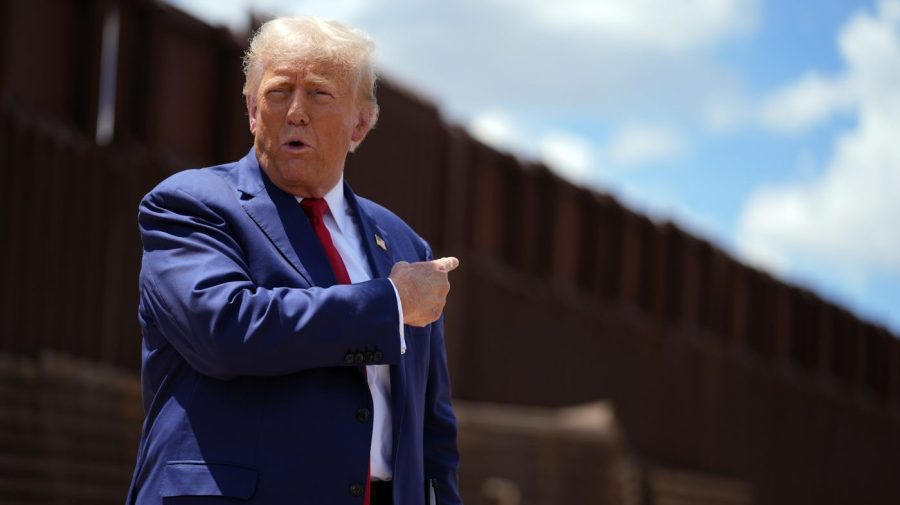Trump faces growing pushback over China chip reversal

President Trump is facing growing pushback on multiple fronts over his administration’s decision to allow Nvidia to sell its H20 chips to China, a move that critics argue could give Beijing a leg up in the race to develop artificial intelligence (AI).
A group of former national security officials and tech policy advocates called on Commerce Secretary Howard Lutnick to reverse course in a letter Monday, as several Democrats and at least one key Republican voiced concerns over the decision.
“[W]e believe this move represents a strategic misstep that endangers the United States’ economic and military edge in artificial intelligence (AI)—an area increasingly seen as decisive in 21st-century global leadership,” the letter reads.
The Trump administration initially restricted sales of Nvidia’s H20 chips to China in May, but the chipmaker announced earlier this month that it was taking steps to sell the chips again after receiving assurances from the government that its licenses would be granted.
Lutnick indicated the decision was part of a broader rare earth deal with Beijing, while arguing that they were only receiving Nvidia’s “fourth best” chip.
However, this has done little to assuage concerns. Monday’s letter argued the H20 is not an outdated chip and can still accelerate China’s AI capabilities, while limiting the number of chips available to the U.S.
It also suggested the move would likely weaken the effectiveness of export controls and encourage Bejing to seek more concessions from Washington.
Reps. Raja Krishnamoorthi (D-Ill.), the top Democrat on the House Select Committee on the Chinese Communist Party, and Gregory Meeks (D-N.Y.), the top Democrat on the House Foreign Affairs Committee, similarly expressed concerns Sunday that the administration is using export controls as a “bargaining chip.”
“This approach risks eroding the credibility of our export controls regime, blurs the line between economic and security priorities, and sends a dangerous signal that critical guardrails are up for negotiation,” the lawmakers wrote in a letter to Lutnick.
The two Democrats suggested they “no longer have confidence” the administration is following the “rigorous, evidence-based interagency process” required to determine export controls under the law.
“It is clear that this Administration is gambling with our national security and our economy all for the sake of President Trump’s trade war that is harming American families, workers, and consumers,” they added.
Their letter was followed up by another from Senate Democrats, including Senate Minority Leader Chuck Schumer (N.Y.) and Sens. Mark Warner (Va.), Jack Reed (R.I.), Elizabeth Warren (Mass.) and Chris Coons (Del.).
They argued the decision to allow for H20 sales to China undermines the Trump administration’s AI Action Plan unveiled last week, which focused heavily on winning the AI race with China.
“Remarkably, the administration’s own AI Action Plan may in fact exacerbate the harm of rescinding these controls,” the senators wrote in Monday’s letter.
“[B]y aggressively endorsing proliferation of powerful open weight models from U.S. firms, while simultaneously giving PRC firms access to leading-edge chips to finetune those models and deploy them to millions of global users on H20-enabled PRC cloud infrastructure, the administration has in effect reduced two key barriers to PRC efforts to challenge U.S. AI leadership,” they added.
At least one key Republican has also spoken out about the decision — Rep. John Moolenaar (R-Mich.), chair of the House Select Committee on the Chinese Communist Party.
He warned in a letter to Lutnick earlier this month that allowing H20s into China could boost their AI capabilities and urged the Commerce Department to limit export controls to a “slight technical improvement” on Beijing’s current capabilities.
Trump’s chip policy is also facing scrutiny in other respects. After rescinding former President Biden’s AI diffusion rule in May, Trump has yet to introduce a replacement framework.
The diffusion rule placed curbs on chip sales to most countries around the world other than a select few U.S. allies.
Several House Republicans led by Rep. Mark Alford (R-Mo.) urged the Trump administration in letter earlier this month to provide a “stable exporting structure” to replace the rule.
Trump touted his decision to walk back the diffusion rule last week as part of his AI Action Plan’s focus on exporting U.S. technology abroad, slamming what he described as the Biden administration’s “extreme restrictions” on chip exports.